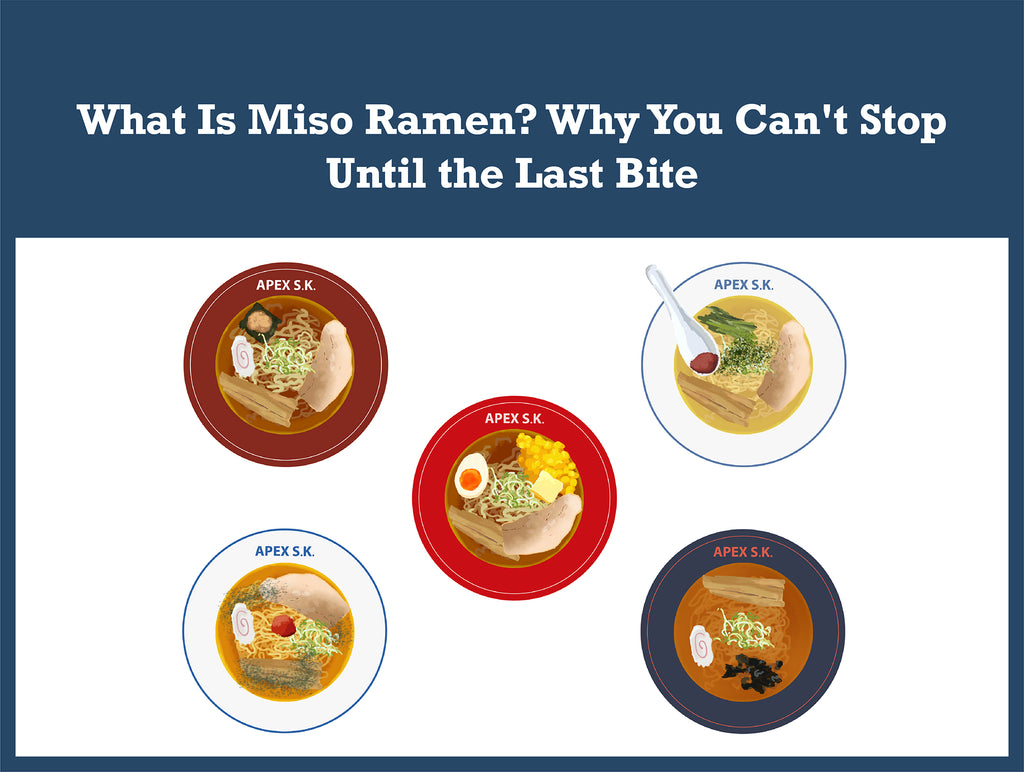
Miso ramen looks like this…

Do you want to know what it tastes like?
Miso ramen always has a very thick and rich soup.
It is comforting and satisfying.
You will taste the saltiness and a creamy flavor of miso while you are eating miso ramen.
I cannot imagine a good miso ramen dish that has thin soup!

Do you want to know about miso ramen in detail? Keep reading and you will find out…
1. Miso ramen consists of...
2. The actual history of miso ramen
3. How miso ramen is different from miso soup?
4. What you must know about miso
5. Unknown regional variations of miso ramen
6. Must try miso ramen instant noodles
7. A miso ramen recipe you will be excited about
1. Miso ramen consists of...
Soup, noodles, and toppings.
Did you know?
The ideal characteristics of soup, noodles and toppings are different for each ramen type.
i. Soup
People use chicken or pork as the base of this broth.
Miso, created from fermented soy beans, is the most important aspect of this soup.
The richness of miso keeps the broth hot, and it warms the body up and you feel instant bliss while eating a piping hot bowl of miso ramen in the harsh cold winter…

ii. Noodles
Miso ramen goes well with yellow, wavy, medium-thick and high water addition noodles.
Noodles for miso ramen are soft and springy.
They are smooth and have a nice chewy texture.
And they give you a sense of happy satisfaction and enjoyment
Do you want to know more about the thickness and shape of noodles?

iii. Toppings
Toppings of miso ramen are chashu, menma, fried vegetables (ex. bean sprout, cabbage), corn bits, and butter.(if pork and vegetable are fried together, there is no chashu)
Yummy!
Do you want to know all the ramen toppings?
Click here to learn 30 plus ramen toppings

2. The actual history of miso ramen
So, out of the 4, which one is the “newest"?



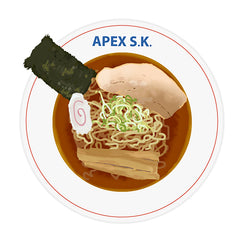

The answer is ...
"C"

i. Creation of the miso ramen is actually quite recent.
In 1955, miso ramen was created by Morito Omori, who was an owner of a restaurant in Sapporo, Hokkaido called Ajino Sanpei.
Omori-san read a magazine called Reader's Digest.
In the article the president of a Swiss food company said:
"Miso is really useful. Japanese people should use miso more often in their cuisines”

Omori-san was impressed at how miso, a Japanese traditional seasoning, was perceived so favourably overseas.
He started thinking up recipes which he could incorporate miso.
He obtained different types of miso all around Japan, tested recipes, and asked his customers for their opinions.
I am really grateful for Omori-san's creation!
Because miso ramen tastes reeeeally good!

ii. But wait. There were similar cuisines before miso ramen
Have you ever heard of houtou and miso nikomi udon?
They are different types of udon dishes.
What is houtou?

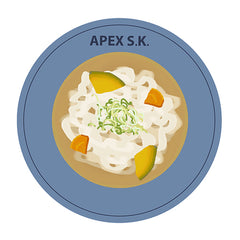
Houtou is a miso-soup based cuisine that has flat udon noodles, pumpkins, potatoes, mushrooms and meat in it.
The powerful Japanese feudal lord, Takeda Shingen, picked houtou for field rations in the Warring States period (1467 to 1615).
Houtou is good for digestion and has a lot of nutrition.
So it was perfect for the battle field.
It would raise the samurai’s spirit before the battle because houtou is very satisfying.
Soup: MisoNoodles: Flat
Toppings: Pumpkins, potatoes, mushrooms and meat
What is miso nikomi udon?


It is udon noodles inside miso soup.
You use deep brown miso called haccho miso in order to make the soup of miso nikomi udon.
It is always served in a clay pot, so you can keep your miso nikomi udon hot for a long time.
Noodles for miso nikomi udon are really thick and hard.
They are served al dente.
You don’t use salt when you make noodles, so these noodles don’t have bounce and chewiness as much as other udon noodles.
It is said that miso nikomi udon was created from houtou.
It was invented in the beginning of the Meiji period (1868 to 1912).
Soup: MisoNoodles: Thick and al dente
Toppings: Eggs, Kamaboko, green onions, meat, and fried tofu
As I’ve just described, there were some variations of miso soup noodles before the creation of miso ramen.
However:
I don’t think Omori-san, who was the owner of Ajino Sanpei, got the idea for miso ramen from houtou and miso nikomi udon.
Because Hokkaido and Yamagata/Aichi prefecture are very far.
But perhaps the reason why miso ramen became popular in Japan might be because there has been a culture of putting noodles in a soup made from miso for a long time.

3. How miso ramen is different from miso soup?
Miso ramen soup and miso soup are both made of miso.
You might think “Then I can make miso ramen by putting noodles into miso soup”
Well, things are not that simple.
I will be puzzled if someone serves me noodles in miso soup.
Because there are some differences.
Miso soup looks like this…

Difference No.1 Ingredients are different
Miso ramen has noodles, chashu, corn, beansprouts, seaweed, and butter.
But miso soup usually has tofu, fried tofu, and seaweed.
Difference No. 2 Soup stock is different
When you make miso ramen, you use chicken broth, pork broth, dried sardine, bonito, scallops, or kelp.
It takes a lot of time to make miso ramen broth.
However, when you make miso soup, you use bonito or kelp for broth.
And it takes relatively a shorter amount of time.
Difference No.3 Roles on the table are different
Miso ramen can be a main dish and you will be full by eating only miso ramen.
But miso soup is something that is more of a side dish.
There are always other dishes such as a bowl of rice and fried fish.
If miso soup is the only dish for my dinner, I will feel it is incomplete.
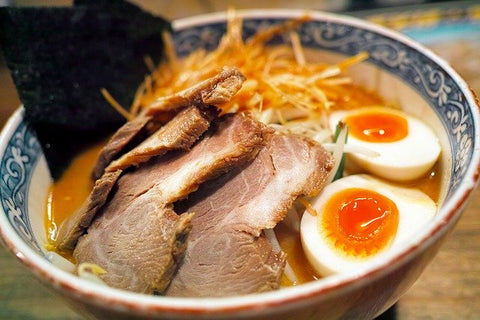
4. What you must know about miso
There are also many health benefits of miso...
i. Miso is a fermented food, so it improves intestinal health and helps your immune system.
ii. The salt content in miso doesn't raise your blood pressure as much as other salty food would.
iii. Miso ramen is often topped with many different types of vegetables. You can take in a lot of vegetables compared to other kinds of ramen.
Miso is pretty good for overall health as well as exceptionally delicious! I make miso soup almost everyday since it is healthy and my wife likes having it with dinner!

Now that you have a better understanding of miso ramen, let's talk about the different types of miso ramen out there.
Which type of miso ramen should you choose???

5. Unknown regional variations of miso ramen
Did you know?
Ramen has a lot of regional variations in Japan.
They are called gotouchi (locally-owned) ramen.
So does miso ramen.
The main difference between each gotouchi miso ramen is…
The miso that they use.
Because each region has its own history, ingredients and processes of making miso,
They are so proud of the miso they grew up with.
Sapporo Ramen


Sapporo ramen is characterized by wavy and thick noodles paired with a thick broth and a little bit of a ginger and garlic flavor.
The soup is made of pork bone. Topping are green onion, bean sprout, menma, and chashu or ground pork.
Don’t know what some of these toppings are?
Check out our list of 30+ common Japanese ramen topping ingredients!
A specialty of Sapporo ramen is that a lot of restaurants allow customers to customize their ramen toppings, for example, corn, butter, crab, and scallops.
Soup: Pork bone
Noodles: Wavy and thick noodles(cutter number: 22), high water addition rate: 34 to 40%
Toppings: green onion, bean sprout, menma, and chashu or ground pork
Jigoku Ramen (KITAHIROSHIMA)

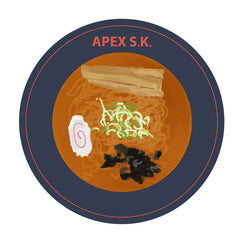
Jigoku ramen is a spicy ramen. Karamiso (hot pepper miso) is used in making the ramen.
There is a hot pepper miso container on the table, so customers can adjust the spiciness to their liking.
At some restaurants, hot pepper is also used in the production of the noodles.
Soup: Spicy miso and pork bone
Noodles: Middle thick, wavy, low water addition rate
Toppings: Chashu, green onions, naruto, bean sprout
Sendai Ramen (SENDAI MIYAGI)
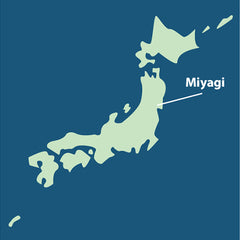

Miso is a specialty of Sendai since the period of Masamune Date, the famous clan leader and founder of modern-day Sendai.
Pork bone and chicken bone broth is used to make this ramen.
You taste the creamy miso broth on its own first and then you can melt Karamiso (served on a spoon) and adjust the spiciness.
Soup: Miso, pork bone, and chicken boneNoodles: Thick and wavy
Toppings: Chashu, green onions, and menma
Akayu Ramen (NANYO, YAMAGATA)


The Akayu ramen is created at a restaurant called Ryushanghai.
When it first opened, the restaurant was not popular, so the owner brought the leftover soup back home and made miso soup out of it.
One day, the store owner’s son put the noodles into his miso soup and said, "Dad, it is yummy!" and the owner started creating this recipe.
Karamiso is also used when eating this ramen. Since it is spicy, you shouldn't mix all the karamiso at once.
Soup: Dried sardine, pork bone, chicken bone, onions, and garlicNoodles: Thick, wavy and high water addition
Toppings: Chashu, naruto, menma, karamiso(spicy miso)
Nigata Nouko Miso Ramen (NIGATA)


This region’s miso ramen specialty features very thick noodles in a thick, rich soup.
Pork bone broth and red miso makes this soup so creamy and rich.
Customers can adjust the thickness of their soup by thinning it out with a bowl of broth (which is served up separately).
There are a lot of vegetables and ground pork as toppings to these noodles.
The noodles are also very thick (almost like udon), so customers will be really full after eating it.
Soup: Thick and rich pork bone broth and red misoNoodles: Very thick
Toppings: Vegetables and ground pork

6. Must try miso ramen instant noodles
After knowing the health benefits of miso ramen,
You might be thinking of making miso ramen at home.
However:

There is a lot of work involved in making ramen noodles from scratch.
Using instant noodles might be an option for you.
Here are my recommendations of instant noodles miso flavor…
I. MARUCHAN - SEIMEN JAPANESE INSTANT RAMEN NOODLES MISO TASTE 18.5OZ
MY THOUGHTS OVERALL ★★★★★
Have you ever had a moment where you were hungry and craved for some ramen?
The easiest and fastest way to satisfy this craving is with instant noodles, but after eating, you feel...
"Oh, this is not what I wanted."
And it does not satisfy your craving. Right?
It will not happen with Maruchan's Seimen miso flavor!
These noodles are authentic and delicious!
If you haven’t tried these yet, you need to try them. It might be one of the best Japanese ramen you have ever had!
I have done some review of these instant noodles.
II. NISSIN - RAOH JAPANESE INSTANT RAMEN NOODLES MISO 17.1OZ
MY THOUGHTS OVERALL ★★★★★
This is the high-end stuff that tastes as good as the fresh ramen that you can get at ramen shops. Your taste buds will tell you this is real ramen.
It has a great consistency and taste.
In other words...
It is definitely worth the money and totally different from the cheap 50-cent ramen from the supermarket.
They are excellent base for a complete family meal if you add some vegetables and proteins.
It has been my Sunday lunch staple for my family and I. Your family will love it too!
I have done some review of these instant noodles.
III. SAPPORO ICHIBAN MISO RAMEN
MY THOUGHTS OVERALL ★★★★☆
Trust me. It’s worth it.
It is an affordable option, that does not skimp out on quality.
If you like instant noodles, this is one step up from regular cup noodles.
Do you want to try a new flavor?
If you are looking for break from the beef, pork, chicken or oriental flavor noodles, but you don't want to raise your budget, these noodles are the perfect choice for you.
It has a very long shelf life, so it makes storing these noodle packages much easier.
I have done some review of these instant noodles.

7. A miso ramen recipe you will be excited about
Curious as to how you can create your own shio ramen from scratch?
You will enjoy your miso ramen ten times more if you make it from scratch.
Take a look here!
Component #1 Miso Tare (Miso Sauce)
Ingredients:Ground Pork 3.5 ounce (100g)
Miso 3 table spoons
Doubanjiang 1 table spoon
Sesame Oil tea spoon
Minced Ginger 1 clove
Minced Garlic 1 clove
Directions:Pan fry all of the miso tare ingredients until they are cooked.

Component #2: Broth
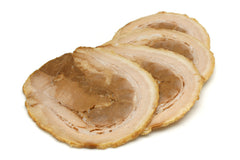
Component #3: Chashu

Component #4: Ajitama

Component #5: Noodles

Component #6: Green Onions, Butter, and Corn
Now that you have all the components of the ramen, let’s start making miso ramen!
Direction to miso ramen
1. Boil noodles in a pot.
2. Prepare a ramen bowl and pour the miso dare and broth in it.
3. Mix the miso dare and broth together.
4. Put drained noodles in the bowl.
5. Put in your ramen toppings: ajitama ramen egg, chashu, butter, corn, and chopped green onion.

If ramen or any other types of Japanese style noodles and soup is comfort food for you, you might be thinking that you need ramen bowls.
Ramen bowls are perfect for a large bowl of ramen.
They are big enough to pile on the fixings, they are durable, and best of all, they look beautiful.
Share a bowl of warm, hearty home cooked ramen with your family, friends and loved ones for your ramen night.
Or when you order take out, transfer the noodles from those awful looking containers.
You and your family will be so excited and can’t wait until your next ramen night to use these bowls!
About the Author

"I am from Ibaraki, Japan.
Ramen is great! It can bring you a sense of happiness and satisfaction that no other food can. I have been eating ramen for 30 years.
If there is no ramen, my life would be miserable.
Ten years ago, I worked as an office worker. The job was really stressful - excessive working hours, low wages, unpaid overtime work, and constantly being yelled at by my boss.
I was new and alone, no girlfriend, no friends, and felt very lonely.
My only oasis was the ramen shop near the office. For me, the ramen chef there was literally an angel. I saw a halo on his head. (No joke)
Tonkotsu shoyu ramen was my all-time favorite. He made ramen with broth chock-full of umami flavor, nice chewy handmade noodles, and tender chashu.
My greatest dream is connect people with ramen through my blog. I want to share a lot of interesting and funny stories and ramen trivia with you.
Knowing more about ramen can help you appreciate your ramen and make it taste extra delicious."
All The Different Ramen Types: It'll Instantly Make You A Ramen PhD




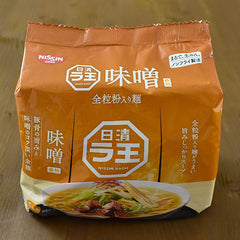



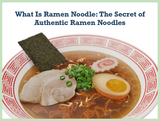
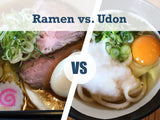

Hi Levi, thanks for reading our article! I’m glad we could give you some ideas on what to eat! Enjoy your miso ramen!
It’s good to know that miso ramen is healthy food for you because it boosts your immune system. My mom will be coming to visit me in the city soon, and I plan to take her out for dinner. She’s immuno compromised because of her disease, so perhaps I should take her to a Japanese restaurant to eat miso ramen. Thanks for the idea! https://www.daiichiramenhawaii.com/
Leave a comment